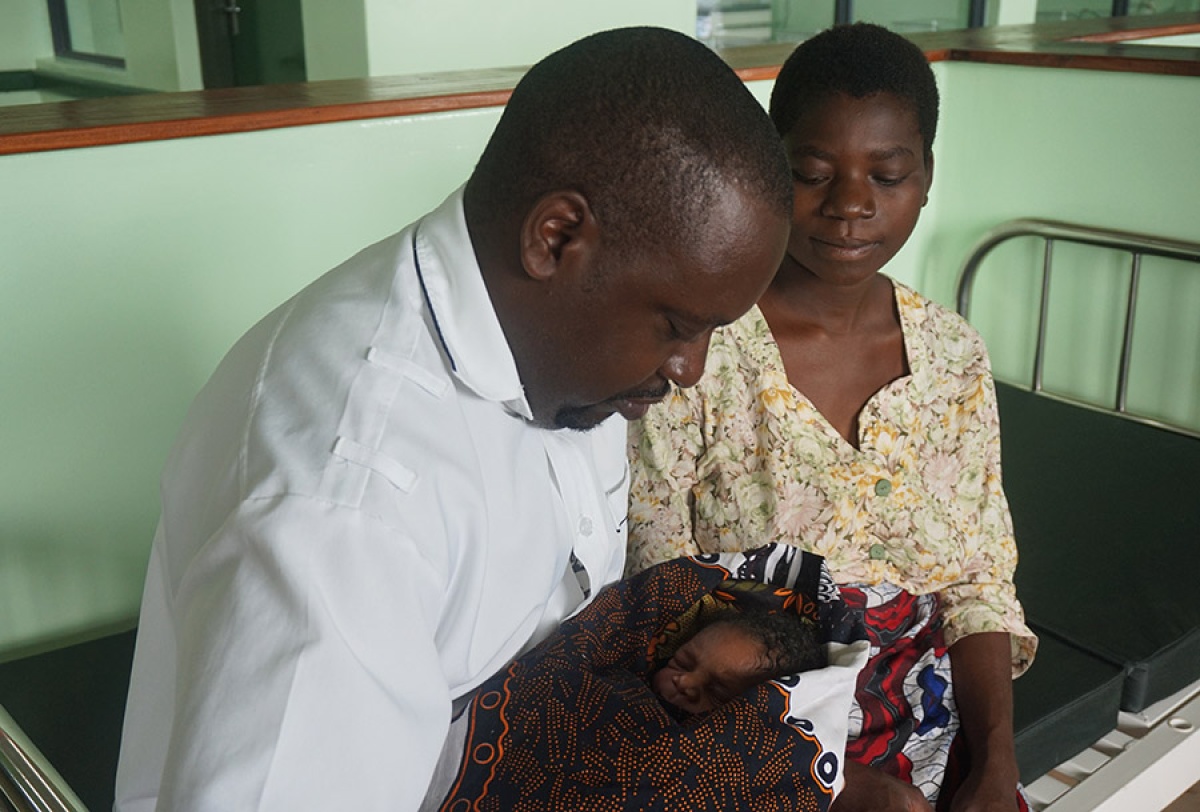Malawi Maternity Ward Welcomes First Babies
Posted on Feb 13, 2015

When Alinafe* went into labor Jan. 28 in rural Malawi, she traveled about 3 miles from her home to Neno District Hospital. Her labor went smoothly, and she welcomed her son that day.
Had she given birth a week earlier, Alinafe’s experience would have been a bit different. She still would have received high-quality care from Partners In Health’s sister organization, Abwenzi Pa Za Umoyo, but she wouldn’t have delivered her baby in a private room at a brand-new maternity ward.
Alinafe’s son was the first child born in the new ward, built by PIH/APZU in partnership with the Malawian Ministry of Health. Alinafe named him Jonas in honor of former PIH/APZU Country Director Dr. Jonas Rigodon, who commissioned the building along with MOH colleagues.
PIH/APZU organized a “Celebration of the Mothers of Neno” this week to mark the start of operations in the new wing. The ward won’t officially open, however, until Malawian government officials visit later this year.
Alinafe said she was pleased with the care she received and happy that the new ward meant she and Jonas could stay at the hospital longer after his birth. Ample space in the 10,200-square-foot wing allows women to stay the recommended 24 to 48 hours after they give birth.
In the old facility, women were discharged from the labor ward soon after giving birth, admitted in the postnatal ward for a minimum of 12 hours, and then discharged with the aim of giving room for other patients to use the services, Ministry of Health Nursing Officer Gladys Ntonya said at the celebration Feb. 11.
Ntonya spoke alongside PIH leaders from Boston who traveled to Malawi for the celebration. Co-founder and Executive Director Ophelia Dahl, co-founder and board member Todd McCormack, and incoming CEO Gary Gottlieb were on hand. They joined local colleagues including PIH/APZU Executive Director Dr. Luckson Dullie and District Health Officer Lawrence Nazimera.
Dullie stressed the need for continued collaboration between PIH/APZU and the Ministry of Health.
“We would like to think that motherhood is something we look forward to,” he said. “It should not be a cause for anxiety. It should not be a cause for apprehension. Our mothers should look forward to being mothers. We realize that to achieve this, we will need partnership at all levels.”
The new ward will enhance care for every woman who gives birth at Neno District Hospital. It includes four private delivery rooms, replacing a facility that had a single two-bed delivery room.
The addition also includes a 9,400-square-foot gynecology ward. Together, the two freestanding wards provide nearly 80 beds. PIH/APZU expects the maternity and gynecology wards to serve a population of about 35,000 women.
Encouraging facility-based births
Thousands of women in Malawi give birth at home each year. PIH/APZU hopes the new maternity ward reduces that number, drawing women to have their babies at the hospital because of the quality of care they’ll receive. The hospital already averages 114 deliveries per month. If every pregnant woman in the catchment area gave birth at the hospital, that would increase to about 160 deliveries per month.
In addition to providing plenty of space for care, the new ward could save lives.
“We expect to have reduced numbers of neonatal deaths since we now have the nursery ward with the required equipment as well as the kangaroo mother care ward,” Ntonya said, referring to care for small or preterm infants that involves skin-to-skin contact. The “maternal death rate is also expected to reduce because the patients are now receiving the required care.”
The new maternity and gynecology wards will provide basic gynecological care, antenatal care, basic and emergency obstetric care, neonatal care, and prevention of mother-to-child transmission of HIV. Women who are at risk of pregnancy complications also will be able to await delivery at the new ward.
“To have seen what there was before, and to see what there is now, it’s difficult to put into words,” Dahl said at the Feb. 11 celebration. “Last time we were here, the maternity ward had two women in each bed, some of the women who had just given birth to their babies on the floor, and people here remember what it was like. And now to see that entire structure laid out, supported by the ministry, and all of the partnership, it’s a very, very heartening thing."
A safe C-section
The improved care made a world of difference for Edina*. She gave birth to twin boys by cesarean section on Feb. 3. The C-section was necessary because the twins were in breech position, meaning they were positioned to leave the uterus buttocks, pelvis, or feet first. Babies typically are born headfirst, which is safest. For cases such as Edina’s, the maternity ward works in concert with Neno District Hospital’s operating theater, which opened in November 2013.
One baby received specialized care because he was small, weighing only 3.5 pounds. The facilities at Neno District Hospital have allowed Edina and her babies to remain as long as necessary, and PIH/APZU staff members are optimistic that the small baby will do well.
Edina had arrived by ambulance with her mother, Chikondi*, whose own delivery experiences differed significantly from her daughter’s. Chikondi gave birth to Edina, the eighth of 11 children, 18 years ago at home. No one was present to help deliver the child, and Chikondi managed alone. Had Edina given birth at home like her mother, she and her boys would have faced serious health risks.
Chikondi welcomed her twin grandsons, calling them a gift from God, and said she was thankful they received good care at Neno District Hospital.
*Names have been changed to protect privacy.

